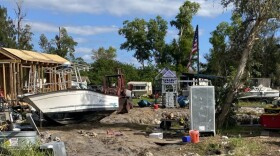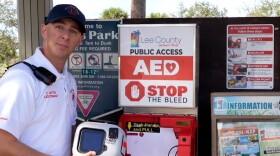NOEL KING, HOST:
We're starting to get data that helps us understand how badly the coronavirus pandemic has hit the U.S. economy. Washington was the first state in the country to report an outbreak. And since then, a lot of businesses have closed as people socially distance themselves. That has inevitably led to job losses. This state is seeing a massive increase in unemployment claims. Suzan LeVine told me about it. She's the commissioner for Washington state's Employment Security Department.
SUZAN LEVINE: What we are seeing with our numbers is four to five times the volume that we saw at peak during the 2008 recession. In our call volumes alone, we have increased by over 1,000% on certain days just week over week.
KING: Is there anything in Washington state that you would point to as a bright spot, a particular company or industry that's doing a lot of hiring right now?
LEVINE: Well, we are. We are hiring. We have, at this point, over a hundred positions available. And we expect to expand that pretty dramatically. So we are seeing a tectonic shift happening in employment right now. At the same time that there are profound layoffs in sectors like hospitality, fitness and dental services, we are hearing increases in job openings in grocery, delivery services, health sectors and unemployment insurance customer service.
KING: I want to ask you about this deal that the White House has reached with lawmakers. Roughly $2 trillion in stimulus money going out all across the country - when you look at what that will mean for workers in Washington state, what do you hope to get from this?
LEVINE: We're working hard to meet the demand with our existing tools. But given the scale and magnitude of those impacted, the federal government will be critical to helping expand benefits. Disaster Unemployment Assistance will allow those who currently are not eligible for assistance or where assistance is not sufficient to meet their needs to carry through this period of time. People are really desperate now. And we need to put money in their pocket, and we need to help businesses stay afloat.
KING: Washington's Governor Jay Inslee announced last week that barbershops and beauty salons would have to close down. A lot of people who work in that particular industry are independent contractors. They can't file for unemployment. Is what you're saying that you would like Washington state to expand the definition of who can file for unemployment or that the federal government is going to expand the definition of who can file those claims?
LEVINE: Disaster Unemployment Assistance, which is a federal program that is typically run by FEMA, or what is being proposed by Congress would cover those not currently eligible for unemployment insurance as each of the individual states define it today - typically used when you have a landslide or a hurricane or a forest fire. And what we are doing with this is proposing a redefinition and adding pandemic or COVID-19 to the definition of what a natural disaster is.
Unemployment insurance is partial wage replacement. It is a great last resort. We need the federal government to help from a scale standpoint in making sure that everybody knows that they are eligible for these benefits that can be expanded with the federal government's support.
KING: President Trump said this week that he wants the U.S. economy to open up and be, quote, "raring to go by Easter." That's April 12. Do you think Washington state will be ready to go?
LEVINE: As I go around my day, I think constantly about my 82-year-old mother, how not to be a vector for this disease to her that could kill her. Once we've got our curve flattened - and then once we have identified - how do we interact with people without having to be suspicious of the contagion? - that, I believe, will be when we can get back to normal. But we're a long way from there, Noel. What we need to do is stay home and stay healthy.
KING: Suzan LeVine, commissioner for the Employment Security Department for Washington state, a department that is now hiring.
Thank you so much for your time. We appreciate it.
LEVINE: Thank you. Transcript provided by NPR, Copyright NPR.







